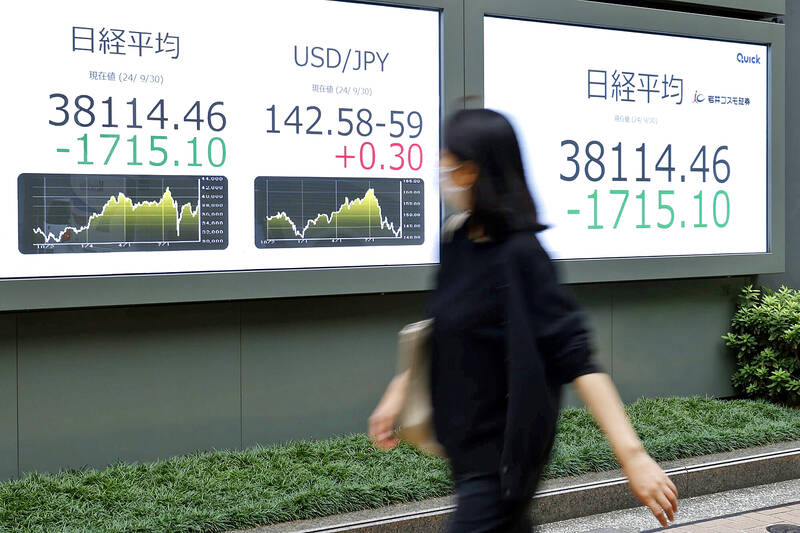Shares in Hong Kong and China rocketed yesterday, extending last week’s surge after Chinese authorities unveiled a raft of measures aimed at propelling the world’s No. 2 economy.
However, Tokyo plunged as much as 5 percent in reaction to Shigeru Ishiba’s election last week as the head of Japan’s ruling Liberal Democratic Party, which boosted expectations that the Bank of Japan would continue hiking interest rates.
Shanghai jumped more than 8 percent — its best day since 2008 — and Shenzhen more than 10 percent, while Hong Kong briefly leaped around 4 percent.

Photo: Bloomberg
Investors have been rushing back into the beaten-down markets in reaction to a series of economy-boosting stimulus out of Beijing over the past week.
Among the measures unveiled were interest rate cuts, easing how much banks must keep in reserve and softer rules on buying homes.
Yesterday, three megacities — Shanghai, Guangzhou and Shenzhen — eased restrictions on buying homes, while six of China’s biggest banks said they would tweak interest rates on mortgages for existing home loans following a request to lower them from the central bank.
The rally — which has seen Shanghai rise more than 20 percent in the past six trading days — comes a day before Chinese markets are closed for the Golden Week holiday.
Moody’s Analytics economist Harry Murphy Cruise said the moves “signal growing unease about the health of China’s economy.”
“That officials brought forward economic discussions to this week’s politburo meeting — rather than sticking to the December schedule — highlights the urgency of the problem,” Cruise said.
The need for stimulus support was highlighted yesterday by data showing China’s factory activity shrank last month for the fifth successive month.
Still, XTB research director Kathleen Brooks said that “the market is not focused on this data, as it is measuring activity before the massive stimulus package, instead, October’s data will matter more for markets.”
The euphoria in China and Hong Kong was in stark contrast to Tokyo, where the Nikkei 225 index plunged as the yen strengthened in the wake of Ishiba’s victory.
Ishiba is expected to maintain many of his predecessor Japanese Prime Minister Fumio Kishida’s policies, but he has also said that “there is room for raising the corporate tax,” while promising to revitalize rural regions.
“Our view is that the basic economic policy philosophy will not change,” UBS Securities Japan Co chief economist Masamichi Adachi said.
Exporters were the big losers as the yen spiked to 141.65 per US dollar in reaction to Ishiba’s win, which observers said would mean the central bank would likely press on with its monetary tightening campaign. The unit had been sitting around 146.50 before Friday’s vote.
Markets were mixed elsewhere in Asia. Taiwanese shares ended down 2.62 percent, and markets in Seoul, Wellington, Mumbai, Manila and Jakarta were also in the red, while Sydney, Bangkok and Singapore rose.
European shares moved lower yesterday. London fell as data showed the UK economy grew less than initially estimated in the second quarter, with Paris and Frankfurt also down.

Intel Corp chief executive officer Lip-Bu Tan (陳立武) is expected to meet with Taiwanese suppliers next month in conjunction with the opening of the Computex Taipei trade show, supply chain sources said on Monday. The visit, the first for Tan to Taiwan since assuming his new post last month, would be aimed at enhancing Intel’s ties with suppliers in Taiwan as he attempts to help turn around the struggling US chipmaker, the sources said. Tan is to hold a banquet to celebrate Intel’s 40-year presence in Taiwan before Computex opens on May 20 and invite dozens of Taiwanese suppliers to exchange views

Application-specific integrated circuit designer Faraday Technology Corp (智原) yesterday said that although revenue this quarter would decline 30 percent from last quarter, it retained its full-year forecast of revenue growth of 100 percent. The company attributed the quarterly drop to a slowdown in customers’ production of chips using Faraday’s advanced packaging technology. The company is still confident about its revenue growth this year, given its strong “design-win” — or the projects it won to help customers design their chips, Faraday president Steve Wang (王國雍) told an online earnings conference. “The design-win this year is better than we expected. We believe we will win

Chizuko Kimura has become the first female sushi chef in the world to win a Michelin star, fulfilling a promise she made to her dying husband to continue his legacy. The 54-year-old Japanese chef regained the Michelin star her late husband, Shunei Kimura, won three years ago for their Sushi Shunei restaurant in Paris. For Shunei Kimura, the star was a dream come true. However, the joy was short-lived. He died from cancer just three months later in June 2022. He was 65. The following year, the restaurant in the heart of Montmartre lost its star rating. Chizuko Kimura insisted that the new star is still down

While China’s leaders use their economic and political might to fight US President Donald Trump’s trade war “to the end,” its army of social media soldiers are embarking on a more humorous campaign online. Trump’s tariff blitz has seen Washington and Beijing impose eye-watering duties on imports from the other, fanning a standoff between the economic superpowers that has sparked global recession fears and sent markets into a tailspin. Trump says his policy is a response to years of being “ripped off” by other countries and aims to bring manufacturing to the US, forcing companies to employ US workers. However, China’s online warriors